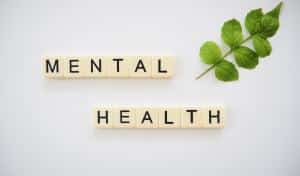
Get A Sneak Peek at my book “Your To-Die-For Life”!
Get a FREE sneak peek! Learn how to use Mortality Awareness as a wake up call to live more boldly.
 I’m a bestselling wellness author so I wrote this guide with signs you might be starting to lose control of your life with tips to help.
I’m a bestselling wellness author so I wrote this guide with signs you might be starting to lose control of your life with tips to help.
Many of us live with the realities of mental health problems being part of the background of our lives. Living with depression, anxiety disorders, stress, and other issues can mean learning to accommodate these problems while still working towards improving our mental health.
However, whether due to stress slowly piling on over time, or a sudden trauma or change that brings emotional upheaval with it, our ability to maintain control can start to slip, and a real mental health crisis can emerge. How do you know when that’s happening to you? And what can you do to stop it?
I’m sharing about this topic because I’m a bestselling author on anxiety and leading Behavioral Change Coach – with about 2 million books sold globally.
Plus I founded the therapist recommended self-paced online course called The Anxiety Cure.
I love to help people to live calmer, happier lives.
Coming up I share 7 signs that life is starting to feel out of control – and what you can do about it.
1. Your sleep quality is getting worse
Our mental health and sleeping health are very closely connected. If you have been having a poor sleep lately, have insomnia, or have simply found it harder to close your eyes due to the thoughts running in your head, this is a clear indicator that depression or stress could be mounting.
One symptom in particular to keep an eye out for is what’s known as “early morning wakening” when you find yourself waking up in the morning and have trouble getting back to sleep again. Talking to your doctor about medication that could help you sleep may help you find some balance, as getting that rest can also decrease stress levels in the body. Just as poor sleep can negatively impact your mental health, good sleep can help with it, too.
Stress can disrupt cognitive function, making it difficult to concentrate and focus. When stressed, the body releases cortisol, a hormone that triggers the “fight or flight” response. While this response is helpful in emergencies, chronic stress can lead to persistently elevated cortisol levels, which interfere with brain function.
High levels of cortisol impair the prefrontal cortex, the part of the brain responsible for executive functions like decision-making, planning, and focus.
Additionally, stress can trigger negative emotions like anxiety and worry, further distracting attention from the task at hand. Ultimately, the combination of physiological changes and emotional turmoil makes it challenging to maintain focus and attention, hindering productivity and performance.
If you find that your emotional state gets kicked into high gear by what, on reflection, seem like minor unimportant issues, then it is a good sign that your stress levels are up way too high.
We all have our moods that change over time, but if you seem to experience mood swings that happen suddenly, or seemingly out of nowhere, it could be a clear sign that you’re getting close to your breaking point.
This can include being much more sensitive to sounds, smells, touch, changes in lighting, and the like. Heightened sensitivity is often related to stress and anxiety disorders.
Poor mental health can manifest in emotional outbursts, characterized by sudden, intense expressions of anger, frustration, or sadness. These outbursts often stem from underlying psychological issues such as anxiety, depression, or unresolved trauma. To control them, individuals can employ various coping strategies.
Firstly, self-awareness is crucial; recognizing triggers and early warning signs can help intervene before an outburst occurs.
Techniques like deep breathing, mindfulness, or physical activity can help regulate emotions and reduce stress. Seeking professional help through therapy or counseling can provide tools for managing emotions more effectively.
Additionally, developing healthy communication skills, such as assertiveness and empathy, can improve interpersonal relationships and prevent conflicts that may lead to outbursts. With patience and practice, individuals can learn to navigate their emotions more constructively.
A lot of the ways that we deal with stress, anxiety, and depression can be classified as a coping mechanism. Coping mechanisms, by and of themselves, do not necessarily need to be bad for us. Meditation, breathing exercises, physical fitness, and the like can be coping mechanisms that have overall positive effects on us.
However, there are other coping mechanisms, such as turning to alcohol, recreational drugs, or abusing prescription drugs, that can negatively impact both our mental and physical health in the long term.
Recognize if you are beginning to have a dependence on unhealthy coping mechanisms, and the steps you need to take, such as attending a drug rehab center, if it’s getting out of control. For many, treating these dependencies includes treating the mental health issues that are so often at the root of them.
Mental health changes can profoundly impact physical well-being, manifesting in various physical symptoms. Persistent stress or anxiety can lead to headaches, muscle tension, and gastrointestinal issues like stomach pain or nausea.
Depression may cause fatigue, changes in appetite or weight, and unexplained aches and pains. Chronic stress can weaken the immune system, making individuals more susceptible to infections and illnesses.
This can trigger palpitations, shortness of breath, and other symptoms resembling heart or respiratory issues. Addressing mental health concerns through therapy, medication, and self-care can often alleviate these physical symptoms.
If you’re experiencing changes to your physical health, make an appointment with your doctor, first and foremost. They may be able to pinpoint when mental health is likely to be a factor.
For those who have anxiety or stress disorders, panic attacks can be an unfortunate part of life. There are ways that we can help recognize and prevent them,
but sometimes they can come on too strong or too quickly for us to be able to do that. If you are having full-blown panic attacks on a more regular basis, then that could be a clear sign that your mental health is declining and that you need to consider help. Cognitive behavioral therapy, in particular, has been put forward as being especially good for panic attacks and anxiety disorders.
Being aware of the signs of an impending mental health crisis can help you know when to get the assistance that you need. If the signs above sound familiar to you, it might be time to start looking.
Explore my bestselling and therapist recommended audio and video course: The Anxiety Cure.
P.S. Before you zip off to your next Internet pit stop, check out these 2 game changers below - that could dramatically upscale your life.
1. Check Out My Book On Enjoying A Well-Lived Life: It’s called "Your To Die For Life: How to Maximize Joy and Minimize Regret Before Your Time Runs Out." Think of it as your life’s manual to cranking up the volume on joy, meaning, and connection. Learn more here.
2. Life Review Therapy - What if you could get a clear picture of where you are versus where you want to be, and find out exactly why you’re not there yet? That’s what Life Review Therapy is all about.. If you’re serious about transforming your life, let’s talk. Learn more HERE.
Think about subscribing for free weekly tools here.
No SPAM, ever! Read the Privacy Policy for more information.